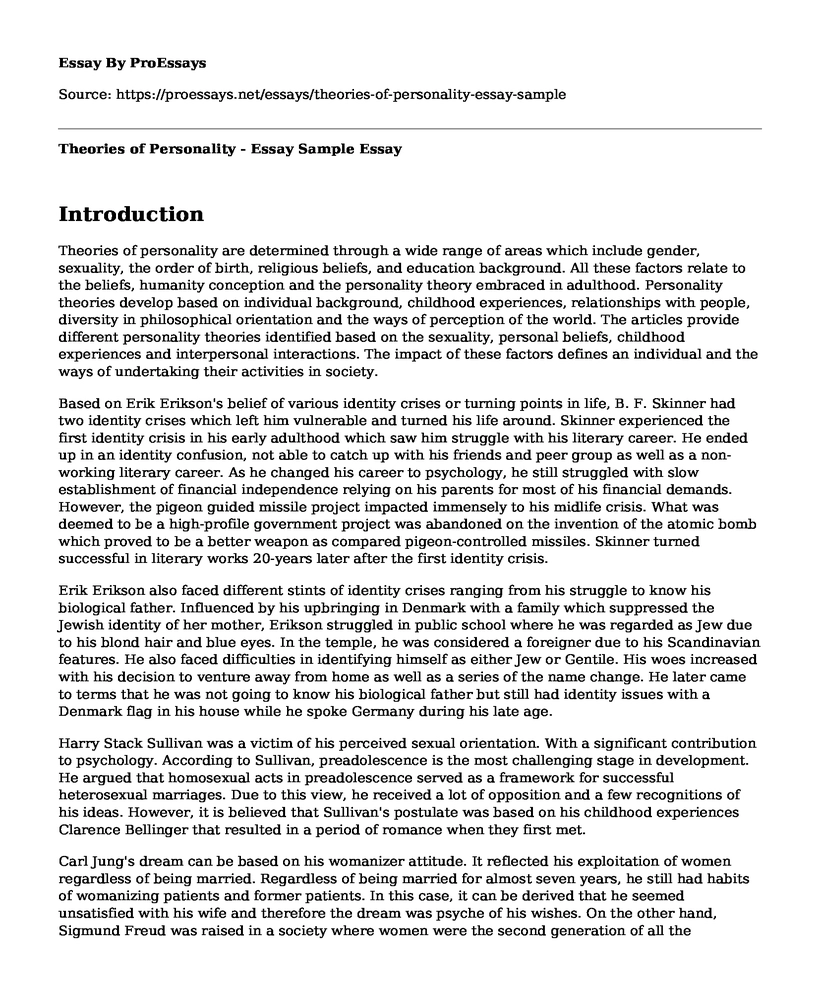Introduction
Theories of personality are determined through a wide range of areas which include gender, sexuality, the order of birth, religious beliefs, and education background. All these factors relate to the beliefs, humanity conception and the personality theory embraced in adulthood. Personality theories develop based on individual background, childhood experiences, relationships with people, diversity in philosophical orientation and the ways of perception of the world. The articles provide different personality theories identified based on the sexuality, personal beliefs, childhood experiences and interpersonal interactions. The impact of these factors defines an individual and the ways of undertaking their activities in society.
Based on Erik Erikson's belief of various identity crises or turning points in life, B. F. Skinner had two identity crises which left him vulnerable and turned his life around. Skinner experienced the first identity crisis in his early adulthood which saw him struggle with his literary career. He ended up in an identity confusion, not able to catch up with his friends and peer group as well as a non-working literary career. As he changed his career to psychology, he still struggled with slow establishment of financial independence relying on his parents for most of his financial demands. However, the pigeon guided missile project impacted immensely to his midlife crisis. What was deemed to be a high-profile government project was abandoned on the invention of the atomic bomb which proved to be a better weapon as compared pigeon-controlled missiles. Skinner turned successful in literary works 20-years later after the first identity crisis.
Erik Erikson also faced different stints of identity crises ranging from his struggle to know his biological father. Influenced by his upbringing in Denmark with a family which suppressed the Jewish identity of her mother, Erikson struggled in public school where he was regarded as Jew due to his blond hair and blue eyes. In the temple, he was considered a foreigner due to his Scandinavian features. He also faced difficulties in identifying himself as either Jew or Gentile. His woes increased with his decision to venture away from home as well as a series of the name change. He later came to terms that he was not going to know his biological father but still had identity issues with a Denmark flag in his house while he spoke Germany during his late age.
Harry Stack Sullivan was a victim of his perceived sexual orientation. With a significant contribution to psychology. According to Sullivan, preadolescence is the most challenging stage in development. He argued that homosexual acts in preadolescence served as a framework for successful heterosexual marriages. Due to this view, he received a lot of opposition and a few recognitions of his ideas. However, it is believed that Sullivan's postulate was based on his childhood experiences Clarence Bellinger that resulted in a period of romance when they first met.
Carl Jung's dream can be based on his womanizer attitude. It reflected his exploitation of women regardless of being married. Regardless of being married for almost seven years, he still had habits of womanizing patients and former patients. In this case, it can be derived that he seemed unsatisfied with his wife and therefore the dream was psyche of his wishes. On the other hand, Sigmund Freud was raised in a society where women were the second generation of all the activities. In this light, he struggled to understand women and the need for equal positions in society. He was raised and given dominance over his sister which extends in his adulthood with the mentality that women are caregivers to children, nurture their husbands and managing households.
Abraham Maslow was intrigued to look for self-actualization in people by his interaction with some of the most exceptional social scientist who he felt influenced his actions. He idolized some of these people whom he wondered why they were so different. On the other hand, his two children enthralled him with their difference in childlike behavior. The need to understand the diversity in individuals, Maslow tried to seek answers as to why Wertheimer and Benedict were so special and different.
Alfred Adler and Freud had an antagonizing character with Freud characterized with ambitiousness, jealous in religious doctrines and failed relationships with people with opposing views. On the other hand, Alfred had a history of opposing the authority which can be dated from his interaction with his elder brother. In this case, the two could not work together and had to break.
The different perceptions, ideological differences and childhood and background of upbringing are illuminated in the articles as the key contributors to the different personality theories.
Cite this page
Theories of Personality - Essay Sample. (2022, Dec 10). Retrieved from https://proessays.net/essays/theories-of-personality-essay-sample
If you are the original author of this essay and no longer wish to have it published on the ProEssays website, please click below to request its removal:
- Functionalism, Behaviorism and Identity Theory Essay
- Causes of Interpersonal Models of Eating Disorders Paper Example
- Paper Example on Inclusion/Exclusion: PTSD & Sensitive Questions
- Essay Sample on Maslow's Pyramid: A Guide to Human Needs Hierarchy
- Literary Analysis Essay on It Ends With Us
- GDP Decline: US Aging Population to Increase 39% by 2050 - Essay Sample
- Essay Example on Panic Disorder: Fear of Anxiety and Its Symptoms







